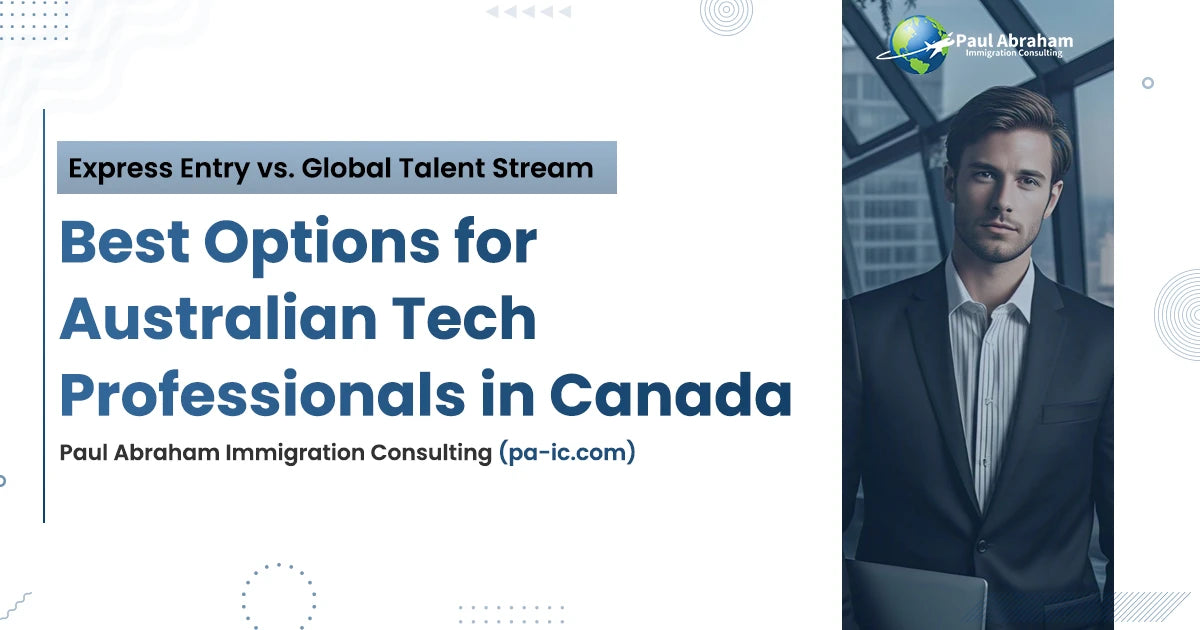As an Australian tech professional looking to move to Canada, selecting the right immigration pathway is crucial. Two popular options are Canada's Express Entry system and the Global Talent Stream (GTS). Here’s a straightforward comparison to help you choose the best option for your career and immigration goals.
Understanding Express Entry
Express Entry is Canada's flagship immigration system designed for skilled workers. It assesses candidates based on a points system (CRS) involving factors like age, education, work experience, and language proficiency.
Advantages:
- Permanent residency status upon approval
- No mandatory job offer required
- Family members can accompany and obtain work/study permits
Considerations:
- Highly competitive, requiring high CRS scores
- Longer processing times (typically 6–12 months)
Understanding the Global Talent Stream (GTS)
The GTS specifically targets highly skilled professionals in the tech industry, providing employers quicker access to foreign talent.
Advantages:
- Fast-track processing (typically 2 weeks for work permits)
- Designed specifically for tech occupations
- Immediate employment in Canada
Considerations:
- Temporary work permit initially (not permanent residency)
- Requires job offer from a designated Canadian employer
Minimum Fund Required - Express Entry Vs GTS
As a tech professional moving to Canada, you must understand the financial requirements you need for any of these programs, including settlement funds, government fees, and credential assessments.
| Pathway | Settlement Funds Required? | Minimum Budget (CAD) |
| Express Entry (No job offer) | ✅ Yes – $14,690+ (1 person) | $17,000+ (including fees) |
| Express Entry (With job offer or in Canada) | ❌ No | ~$3,000 |
| Global Talent Stream | ❌ No | $500 – $1,000 (most paid by employer) |
Express Entry
As a tech professional, the Express Entry system requires you to cover several costs, including government fees, credential evaluations, biometrics, and proof of settlement funds.
Global Talent Stream
If you’re applying through Global Talent Stream, settlement funds are not required.
Side-by-Side Comparison

Which Option Is Right for You?
Choose Express Entry if:
- You're seeking long-term settlement in Canada
- You prefer not to depend on employer-specific work permits
- You have strong CRS factors (age, education, high language scores)
Choose Global Talent Stream if:
- You have a Canadian tech employer ready to hire you immediately
- You prefer rapid processing to begin working in Canada
- You're initially open to temporary status with potential future transition to permanent residency
While Australia offers strong opportunities for tech professionals, Canada often provides a better salary-to-cost-of-living ratio. When evaluating Canada vs Australia expense, many skilled workers find Canada to be a more cost-effective option for long-term financial stability.
Why Canada Is Best for Tech Professionals
While tech professionals in Australia—particularly in cities like Sydney—often enjoy competitive in-hand salaries, a deeper cost-benefit analysis reveals a different picture. Australia's financial appeal diminishes when factoring in the high cost of living, including housing, daily expenses, and transportation. In contrast, Canada offers comparable or higher compensation in many tech sectors. In fact, Canada is more affordable than Sydney in terms of living expenses, making it a more financially sustainable and rewarding destination for skilled immigrants in the tech industry.
Immigration Evaluation For Tech Professional (Express Entry & GTS)
As a tech professional in Australia, your academic credentials and work experience must be assessed under Canadian immigration standards—typically through an Educational Credential Assessment (ECA) by WES or another IRCC-approved body. Depending on your occupation, you may also need to transfer professional license in Canada to meet provincial regulatory requirements.
Final Thoughts
For Australian tech professionals, choosing between Express Entry and the Global Talent Stream hinges on immediate career plans versus long-term settlement goals. Carefully weigh your options, considering processing times, residency preferences, and employment opportunities to make an informed decision.

